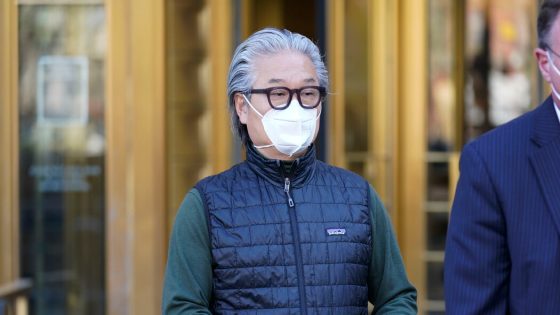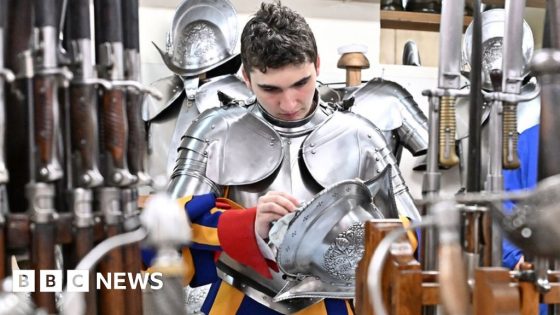Three years ago, a multibillion-dollar investment firm called Archegos Capital Management blew up with little warning, causing big losses for some Wall Street banks and leading to federal criminal charges against the firm’s founder, Bill Hwang.
On Wednesday, Mr. Hwang, 60, who was charged with 11 counts of securities fraud, wire fraud, conspiracy, racketeering and market manipulation, is set to go on trial in Manhattan federal court. If convicted, he could spend the rest of his life in prison.
Federal prosecutors are seeking to secure a conviction in a major stock market manipulation case in which Mr. Hwang, whose legal name is Sung Kook Hwang, was one of the big financial losers. Archegos had managed money mainly for Mr. Hwang, his family and some of his employees, and much of his family’s wealth was wiped out when the firm collapsed in March 2021. Also on trial with Mr. Hwang is Patrick Halligan, the former chief financial officer of Archegos.
Authorities have said Archegos inflated the prices of stocks it invested in by using tens of billions of borrowed dollars from Wall Street banks to keep buying more and more shares. The surging share prices encouraged other investors to buy, pushing the prices even higher. At its peak, the strategy increased Mr. Hwang’s net worth to more than $35 billion, and the overall value of the stocks that Archegos owned was more than $100 billion.
Damian Williams, the U.S. attorney for the Southern District of New York in Manhattan, called Archegos’s scheme to pump up the price of stocks “historic in scope” when his office announced the filing of charges against Mr. Hwang and Mr. Halligan in April 2022.
Barry Berke, a lawyer for Mr. Hwang, declined to comment. But at a court hearing a few months ago, Mr. Berke said his client “never sold a nickel of his shares.”
Mary Mulligan, a lawyer for Mr. Halligan, said, “This is a case that should not have been brought.”
Archegos was little known before its collapse and was not subject to much regulatory oversight because it did not manage any money for outside investors. Yet it operated like a big hedge fund given the level of risk it had taken on and its outsize borrowings from banks — mainly through the use of sophisticated derivative contracts.
The firm thrived whenever the prices of the stocks it bought kept rising. But Archegos, which Mr. Hwang named after the Greek word for leader or prince, seemingly could not handle a sudden downward turn in the market. It collapsed when some of the stocks it had invested in declined in value, prompting Wall Street banks to seize securities and demand that the firm post more money as collateral.
The impact of Archegos’s failure on the stock market was limited, but several banks suffered losses. Credit Suisse, which UBS has since taken over, lost $5.5 billion. UBS itself lost about $861 million from lending to Archegos. Last summer, UBS agreed to pay nearly $400 million to regulators in the United States and Britain because of Credit Suisse’s risk failures in the Archegos affair. Nomura and Morgan Stanley were among the banks that also lost money.
If convicted on all counts, Mr. Hwang could, in theory, be sentenced to 220 years in prison — though a sentence of 20 years is more realistic. By comparison, Samuel Bankman-Fried, the crypto entrepreneur who was sentenced in March to 25 years in a federal prison for defrauding customers out of $8 billion, faced a maximum sentence of 110 years.
The trial begins with jury selection on Wednesday. Prosecutors intend to call as witnesses two former Archegos employees who pleaded guilty and agreed to cooperate with the investigation.
The federal authorities said a critical component of the scheme involved officials at Archegos who misled the banks about the firm’s overall footprint in the market. The authorities also contended that Mr. Hwang had engaged in a “pump and brag scheme” — a strategy designed to substantially increase the firm’s stock holdings and make Mr. Hwang appear to be an “extremely wealthy person.”
But prosecutors have yet to explain just how Mr. Hwang planned to profit by driving up the prices of the stocks Archegos owned. Even the federal judge who will preside over the trial said he was flummoxed by Mr. Hwang’s strategy of simply buying more and more shares.
“What did he want? What did he want to achieve? Being a big shot. I suppose that’s possible, but it doesn’t seem to me that was his aim,” the judge, Alvin Hellerstein, said at a hearing last year. “I can’t figure out his aim.”
Prosecutors have said testimony about potential exit strategies for Mr. Hwang will be produced at the trial.
This is the second time that Mr. Hwang, a former hedge fund manager, has been accused of violating federal securities laws.
In 2012, he reached a civil settlement with the Securities and Exchange Commission in an insider trading investigation that involved his old hedge fund — Tiger Asia Management — and was fined $44 million. Mr. Hwang was not criminally charged, but Tiger Asia pleaded guilty to federal insider-trading charges in a related action brought by federal prosecutors in New Jersey.
In settling with securities regulators, Mr. Hwang was barred from managing public money for at least five years. Regulators formally lifted the ban in 2020. But instead of managing money for outside investors, Mr. Hwang focused on managing money for himself and his family.
Source Agencies


